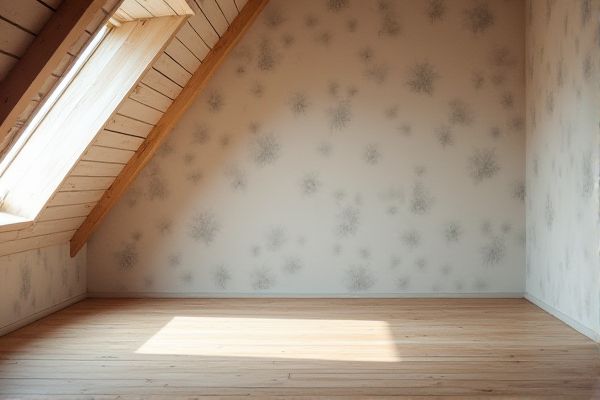
Attic wallpaper offers unique decorative patterns and textures that can add character and warmth to your space, while painted walls provide a clean, versatile, and easy-to-maintain surface ideal for various design styles. Explore the article to discover which option best suits your attic and enhances your home's aesthetic.
Table of Comparison
| Feature | Attic Wallpaper | Painted Wall |
|---|---|---|
| Appearance | Varied patterns and textures, adds character | Uniform color, smooth finish |
| Durability | Long-lasting, resists minor damage | Can chip or peel, requires touch-ups |
| Installation | Time-consuming, requires skill | Quick and easy |
| Maintenance | Requires careful cleaning to avoid damage | Easy to clean and repaint |
| Cost | Higher initial cost including materials and labor | Lower cost, less labor-intensive |
| Moisture Resistance | May peel in high humidity | Better moisture resistance with proper paint |
| Customization | Extensive design options | Color choices limited to paint palettes |
| Environmental Impact | May contain adhesives and chemicals | Low-VOC paints available |
Introduction: Attic Wallpaper vs Painted Wall
Attic wallpaper offers unique patterns and textures that can add character and warmth to your attic space, unlike painted walls that provide a smoother, more customizable backdrop for your decor. Wallpaper's durability and ability to conceal surface imperfections make it ideal for irregular attic walls, while paint allows for easier color changes and simpler maintenance. Choosing between wallpaper and paint depends on your attic's structural features and the style atmosphere you want to create in your home.
Aesthetic Appeal: Design and Style Options
Attic wallpaper offers a vast array of design and style options, from intricate patterns to textured finishes, allowing you to create a unique and visually striking space. Painted walls provide a versatile and timeless aesthetic with endless color choices, enabling easy updates and a clean, smooth appearance. Choosing between attic wallpaper and painted walls depends on your desired level of customization and the atmosphere you want to achieve in your attic.
Durability and Longevity Comparison
Attic wallpaper offers enhanced durability by resisting scuffs, stains, and moisture better than painted walls, making it ideal for spaces prone to temperature fluctuations and humidity. Painted walls, while easier to refresh and repair, may require more frequent touch-ups due to chipping and fading over time. Choosing wallpaper for your attic can provide a longer-lasting aesthetic with minimal maintenance, preserving your investment in the space.
Installation Process: Wallpaper vs Paint
Installing attic wallpaper involves precise measurements and careful alignment to ensure seamless patterns, often requiring adhesive application and drying time, which makes the process more time-consuming compared to painting. Painting walls in your attic typically offers a quicker installation, with fewer materials needed and straightforward application through rollers or brushes. Your choice depends on whether you prioritize a faster setup or a more intricate decorative finish.
Maintenance and Cleaning Requirements
Attic wallpaper typically requires delicate maintenance to prevent peeling and damage from humidity, often needing gentle cleaning with a soft cloth or specialized wallpaper cleaner. Painted walls offer easier upkeep, allowing you to scrub stubborn stains or dirt with mild detergent and water without risking surface damage. Your choice between wallpaper and paint will impact long-term cleaning efforts, with paint providing more durability for frequent maintenance.
Cost Analysis: Budget Considerations
Attic wallpaper typically involves higher upfront costs due to material quality and installation complexity compared to painted walls, which require fewer supplies and less labor. Painted walls offer greater flexibility for budget-conscious projects, allowing for easy touch-ups and color changes without extensive expense. Understanding these cost differences helps you make an informed decision that aligns with your attic renovation budget and long-term maintenance plans.
Insulation and Energy Efficiency
Attic wallpaper provides an extra layer of insulation that can help reduce heat loss and improve energy efficiency by trapping air between the wall and the wallpaper. Painted walls, while easier to maintain, generally lack the insulating properties of wallpaper, potentially leading to higher heating and cooling costs in attic spaces. Choosing insulated or thermal wallpaper specifically designed for attics can significantly enhance temperature regulation and lower energy consumption.
Impact on Attic Space Value
Attic wallpaper can significantly enhance the aesthetic appeal and perceived luxury of an attic space, often increasing property value by adding texture, color depth, and design interest that painted walls may lack. High-quality, moisture-resistant wallpaper designed for attics can protect surfaces while offering unique style options, making the space more attractive to potential buyers. Painted walls provide a clean, versatile look but may not add the same level of distinctiveness or sophistication that wallpaper can contribute to attic value.
Environmental and Health Factors
Attic wallpaper often contains volatile organic compounds (VOCs) and adhesives that can off-gas harmful chemicals, potentially affecting indoor air quality and health. Painted walls using low-VOC or zero-VOC paints offer a healthier alternative by minimizing toxic emissions and reducing environmental impact. Choosing eco-friendly materials for attic finishes can significantly improve air quality and create a safer living environment.
Final Verdict: Choosing the Best Attic Wall Finish
Attic wallpaper offers rich texture and intricate patterns that enhance character and warmth, ideal for creating a cozy and visually dynamic space. Painted walls provide versatility with customizable colors and simpler maintenance, perfect for brightening and visually expanding smaller attic areas. Ultimately, the best attic wall finish depends on desired aesthetic impact, ease of upkeep, and the attic's specific lighting and size conditions.
 homyna.com
homyna.com